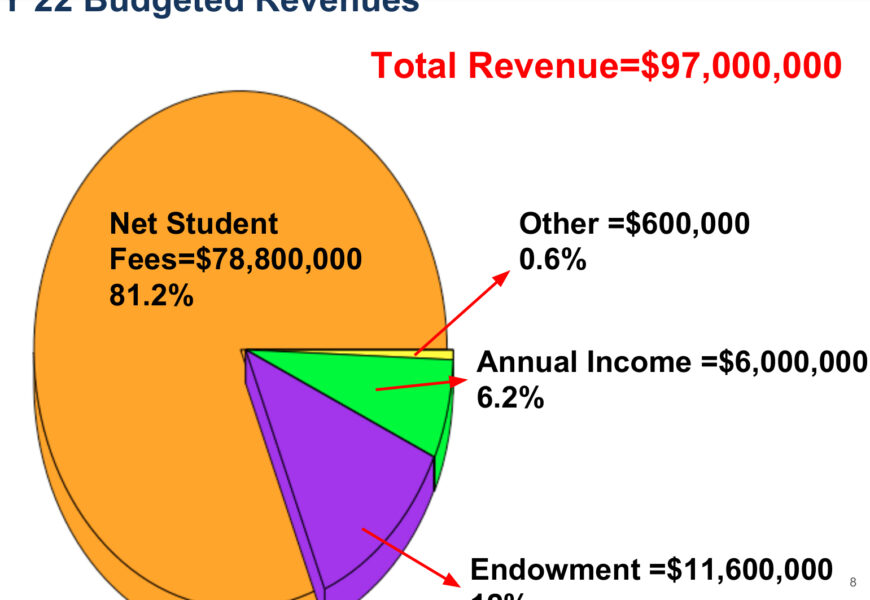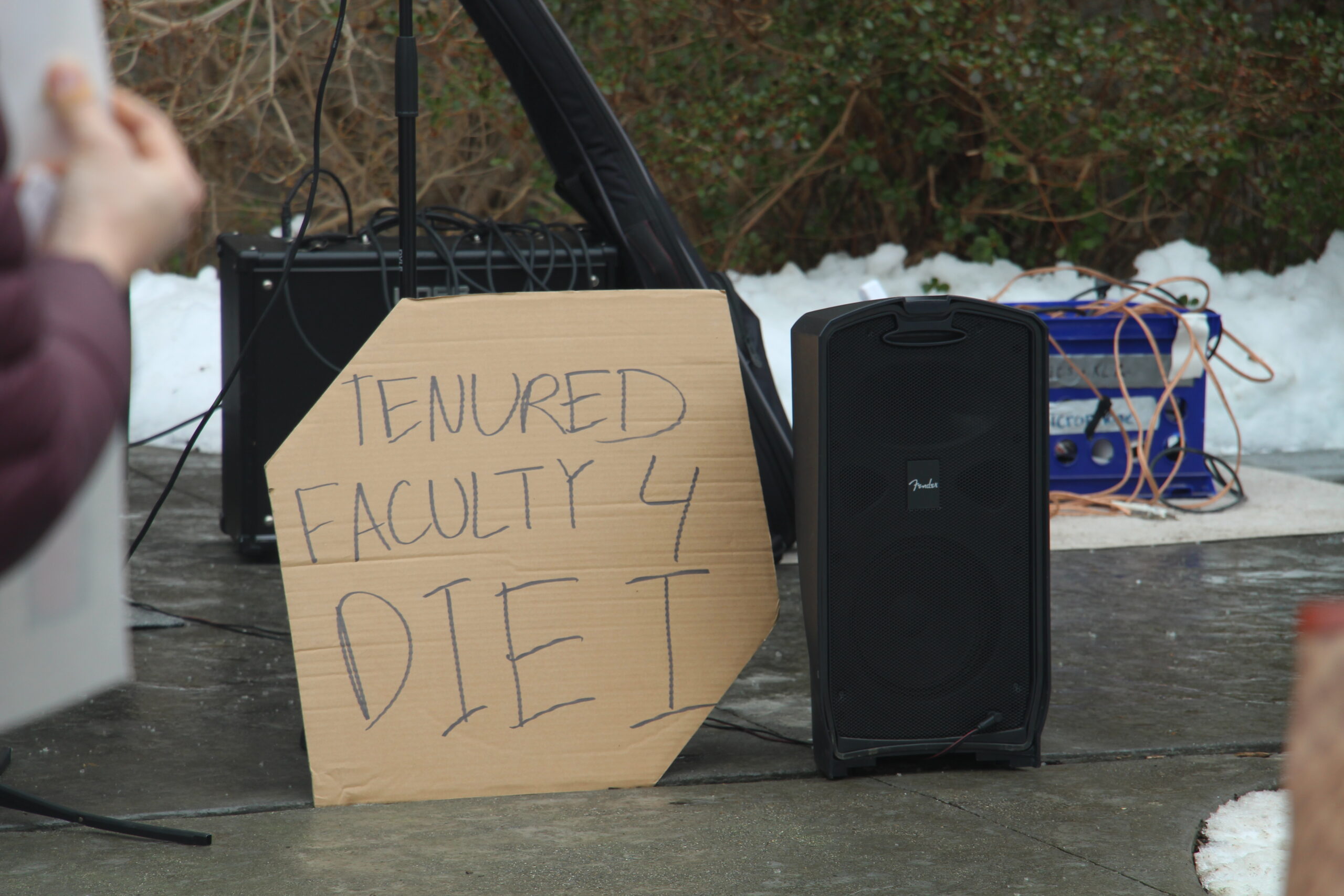Photo courtesy of the PPBC Open Forum.
There has been a rise in disapproval from students towards the administration after it was reported that there was a third voyeurism incident between 2018-2021. At the SGA open forum on voyeurism on Nov. 11, students questioned why it has taken so long for changes to be made in bathrooms and where College funds are going. According to SGA President Samirah Jaigirdar, the open forum for the Priorities, Planning, and Budgeting Committee (PPBC) was originally planned for the day of the voyeurism open forum but was pushed back to Nov. 18. “Initially, we were going to talk about more issues like how the budget folks allocate money to infrastructure and all that,” Jaigirdar wrote, “but understandably, the questions primarily revolved around funding for OSVPA and DIEI.” The heads of the senior PPBC team were in attendance: VP Finance & Administration, Richard Madonna, the chair of PPBC, Professor Priya Kohli, and VP College Advancement and Interim VP for Communications, Kimberley Verstandig. Also in attendance were Dean Arcelus, Dean Smith, Interim Dean Rotramel, and Dean Norbert. SGA has provided The College Voice with the transcript from the open forum.
Professor Kohli gave a Powerpoint that explained the role and responsibilities of PPBC as well as how each department is funded. During a fiscal cycle, the board meets in October to discuss enrollment, retention, and discount rate, meaning that the board understands “the mission, the financial outlook, cost-effective strategies, and challenges of different divisions.” The board discusses compensation, comprehensive fees, and the spent rule in February. The budget is then approved in May. The chair attends cabinet meetings and can bring forward any concerns from staff, faculty, and students at these meetings.
Kohli produced a pie chart of the 2022’s Fiscal Year budgeting expenses and revenues. The 81.2% of the revenue was net student fees which brought in around $78.8 million dollars. 12% of the revenue was from endowment with $11.6 million and 6.2% came from annual income with $6 million. On the other hand, 65.4% of the expenses came from compensation with about $63 million which accounts for the overall amount of money that the College puts towards each division. 23.6% went to the decision operating budget, and 2.6% came from the Study Away program. The three lowest areas of expenses were debt service, asset reinvestment and contingency.
The total operating budget for divisions is $33.6 million and the total compensation is $63.2 million with benefits included. The division with the highest compensation is instruction and faculty with $25.84 million and with $1.87 million in the operating budget. Other divisions that should be noted were the Dean of Institutional Equity and Inclusion (DIEI) which has $1.01 million in compensation with $.24 million in the operating budget, and utilities which has $.41 million in compensation and $2.58 million in the operating budget.
Between the years of 2010-2022, the net tuition revenue has been steady around $75,000. One outlier is in 2021 when the net revenue was below $70,000. The amount of revenue that goes towards financial aid has been increasing. Between 2010-2022, there’s been a $13 million increase. The same trend can be seen for the financial aid within the operating expenses. Between 2016-2022, there’s been a $29 million increase in operating expenses regarding financial aid. Despite more money being put towards financial aid, the operating expense for salary and benefits has been decreasing. In 2016, $67.1 million went towards salary and benefits but in 2022 only $63.4 million is going towards it.
During the question and answer period, a student worker in the Office of Advancement noted that there is more of a focus on athletics rather than DIEI when seeking donations and asked why this was. Verstandig responded that there are multiple layers to fundraising, especially since there are 9 sub departments within Advancement. Money is raised on an annual basis of around 25 million dollars, with goals and reasons for these goals set in place. The Office is currently guided by the 2017 strategic plan which has five key goals listed within the campaign. Verstandig went on to explain that DIEI is infused throughout every goal which is why it doesn’t have its own goal.
One of the roles of the Advancement office is to go and talk to donors of interest. There isn’t enough staff for someone to be the point person for every single department. “We are trying to get more offices involved,” Verstandig explains. Another student questioned why many alumni don’t know a lot about the funding campaigns. Verstandig responded that there are multiple phases to a 7 year campaign: the first 3-4 years is the silent phase, where you only talk to big donors. The public phase begins Jan. 2022, meaning that the campaign will be nationally “more out there.”
Madonna mentioned that the College looked at what can be done to mitigate risk in the bathrooms regarding voyeurism and is currently meeting with architects to find both short-term and long-term solutions, which would require huge infrastructure changes. Solutions like enhancing security take time and money. Madonna explained that “the College will find the dollars” even though the budget hasn’t changed. The College has a student emergency fund which is there to help with crises and is always open for people to make donations to. The greatest challenge right now is operating expenses, stating that “the operating budget is just not where we want it to be.” The Office is trying to reallocate the funds and spend less. Dean Arcelus jumped in to mention that “there are processes that need time to be seen in action.” He went on to say that $100,000 dollars raised above the budget will be distributed to DIEI, in order to prioritize survivors and the Sexual Violence Proventation and Advocacy program. Dean Rotramel made it a point that while they are grateful for the $100,000, the operating budget is a sliver and the DIEI office is working to really increase and boost this. “The operating budget is how we can do things, it’s very important. Long term needs are really staffing, we need people!”
In response, one of the students asked the PPBC to explain how the decision was made for the President to receive raises while initiatives and offices where money was needed more. Madonna explained that President Bergeron did not in fact get a raise. Rather, in 2019 Bergeron was eligible for a cash out sabbatical of around $200,000 which was a form of compensation. Madonna went on to mention that Bergeron actually reduced her salary by 25% during the pandemic year, but the base salary did not change.
A student spoke out about how the College has not provided enough support systems in the aftermath of the voyeurism case, especially since counseling hours have been shortened in half. The College is in the process of hiring two new counselors and is launching a search for a permanent counselor next year. There are also two new student support specialists starting this year.
At the end of the open forum, a student pointed out that the same problem keeps happening on campus due to the culture that has been created. As a result, she demanded that the administration takes a public stance to fight rape culture. While there was no guarantee of change to be made from the administration, it was noted that few members of the administration were in vocal agreement that rape culture needed to end.
To keep the momentum going, it is important that students continue to speak out about concerns to the administration.










